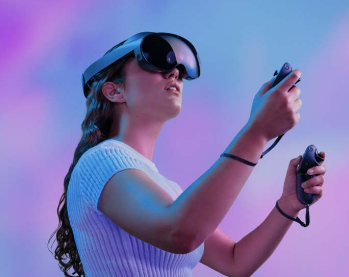The Metaverse: Going above and beyond reality

Meta believes virtual reality is key to a more connective future.
November 3, 2022
What better way to be a part of reality than virtually? Mark Zuckerberg’s technology parent company Meta says that there’s no better way. Meta’s newest project is “the Metaverse,” an immersive virtual reality experience that Zuckerberg referred to as “the next version of the internet,” in a video Meta released at Facebook Connect, on Oct. 28, 2021.
Meta is an American multinational technology conglomerate that owns Facebook, Instagram, Messenger and WhatsApp. In a video called “The Metaverse and How We’ll Build It Together – Connect 2021,” Zuckerberg announced the company’s shifted focus onto building a virtual reality they are calling the Metaverse.
Like many other extravagant concepts, the term “metaverse” was first introduced in literature. American author Neal Stephenson first coined the term in his science fiction novel “Snow Crash,” released in 1992. Stephenson described the metaverse as a then futuristic virtual reality where humans could connect with one another. Thirty years later, Stephenson’s fictional concept is now a $15 billon dollar business plan at Meta.
Meta is not the first to create a virtual reality platform/console. According to Virtual Speech, “Cinematographer Morton Heilig created Sensorama, the first VR machine (patented in 1962) … It combined multiple technologies to stimulate all of the senses: there was a combined full colour 3D video, audio, vibrations, smell and atmospheric effects, such as wind.” Ever since then, virtual reality consoles have evolved and have become what some would call household objects.
Meta created their very own VR devices, “the Meta Quest 2” and the “Meta Quest Pro.” These devices are best described as bulky goggles. The Meta Quest 2 and the Meta Quest Pro serve as portals to the Metaverse. The cost of these headsets ranges from $400.00 to $1400.00, making a “ticket to the Metaverse” quite expensive. Meta has also partnered with Ray-Ban to create “Ray-Ban stories,” which are “smart glasses designed to keep you in the moment,” as stated on Meta.com. The Ray-Ban story smart glasses have a built-in camera, open ear audio and “seamless social sharing.”
VR living existed long before the Metaverse. Some popular examples of VR include second life, Active Worlds and VRchat. VRchat closely resembles the Metaverse—but according to Meta’s website, the Metaverse is the better future of connection. Meta says what will separate the Metaverse from other VR platforms is the all-inclusive experience it will offer. In other words, the Metaverse will be a conjunction of social media, entertainment, gaming, exercise, work, augmented reality, etc. In Meta’s hour-long video, people were able to virtually join concerts happening across the world, share 3D street art, build luxurious homes, attend work meetings and more.
Meta’s advertising of the Metaverse and their VR devices is somewhat ambiguous. Their website is sporadically filled with phrases and visuals used to mainstream the Metaverse. Some of those phrases include “Work in the virtual world. Stay in the real world,” “Collaborate in mixed reality together, apart” and “Look at reality through an entirely new lens.” Meta seems to be focused on advertising their future inventions—half of the things advertised on their website have yet to be created.
Meta and its partner companies are still building the technology needed to make the Metaverse resemble what they have advertised. Meta client partner Grazia Ochoa recently visited Iona University to talk about her work in the Metaverse with students in the Hynes Institute on Oct. 13. Ochoa works for the Royal Caribbean and Disney Parks—she is helping Meta integrate these services into the Metaverse. After Ochoa explained her work with Meta, many students expressed their concerns about the consuming nature of the Metaverse, asking how Meta hopes to help the issue of excessive technology usage in society. These are valid concerns to have considering Meta’s projection of the future seems to be entirely virtual and computer generated.
Other students believe that excessive technology use will not be an issue because the Metaverse will not work as expected. Demar Scott is a freshman majoring in computer science and said that the Metaverse “sounds cool, but it might not play out how people expect it to.”
Juan Ibarra is another student who thinks that the Metaverse is not Meta’s best work.
“I think it’s pretty dumb…I think real life experiences are better than fake ones,” Ibarra said.
There is a lot of back and forth on the Metaverse, and because so much of the Metaverse’ foundation has yet to be created, there is so much uncertainty about the influence and power it will have in the future.
“You don’t know what people will be doing ten years from now,” Ibara said. “A new generation may grow up around that technology and might find that [the Metaverse] is a cool thing to do. But, as of right now it just sounds like a fantasy.”
There are two general consensuses on the Metaverse. One consensus is that the Metaverse is money-losing business that will not live up to its full potential—this notion is becoming more popular especially after “Meta shares fell 25% to $97.94 on [Oct. 27], pushing the stock to its lowest point since December 2016,” according to Forbes Magazine. The other consensus is that the Metaverse is a tremendous idea that just needs time to come into fruition. Ibarra seems to have an understanding of both consensuses.
“The fact that you could buy and sell property with real money is kind of stupid, but at the same time there are things like that in real life like trading cards, they have no value in the real world, but people add that value,” Ibarra said. “There is a very niche market of people who love VR. If VR becomes more accessible and less expensive, I definitely see a growth of interest in the Metaverse.”
Whether people like it or not, Meta continues to work on the Metaverse, all while pushing their idea of a virtual yet somehow more “connective” future. Zuckerberg has acknowledged the world’s—specifically the first world’s—reliance on technology and is hoping to embark on what is bound to happen in the future.
Sources:
The metaverse explained: Everything you need to know (techtarget.com)History of VR – Timeline of Events and Tech Development (virtualspeech.com) Meta representative shares future of Metaverse at CEO GaelTalk – The Ionian
The Metaverse is the Future of Digital Connection | Meta



